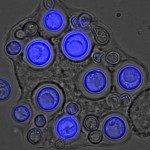Link to Pubmed [PMID] – 19090753
Link to DOI – 10.1086/595688
Clin Infect Dis 2009 Jan; 48(2): 194-202
Infections of renal grafts with Candida species can induce life-threatening complications in the recipient.A 9-year retrospective study involving all of the transplant centers in France was designed to determine the incidence, origin, characteristics, and outcome of graft-site candidiasis that occurred after kidney transplantation. Yeasts cultured from preservation or drainage solutions and graft specimens were recorded.Among 18,617 kidney grafts, 18 recipients corresponding to 12 donors developed culture-confirmed graft-site candidiasis (incidence, 1 case per 1000 grafts) a median of 25 days after the graft procedure. Clinical presentations included 14 cases of renal arteritis (13 were complicated by aneurysm), 1 urinoma, 2 graft site abscesses, and 1 surgical site infection. Candida albicans was involved in 13 cases. A unique C. albicans genotype or a single rare Candida species was involved in each episode. Together with the clinical history, these findings demonstrate that organ contamination followed by transmission to the recipient occurred during recovery. Therapeutic management varied from simple monitoring in 1 case to a combination of surgery (nephrectomy in 9 cases and arterial bypass in 9 cases) and antifungal therapy (14 cases). Overall, 3 of 18 kidney transplant recipients died, and 9 had their graft surgically removed.Graft-transmitted candidiasis that ends most often in fungal arteritis is associated with high morbidity and mortality after kidney transplantation and is related to organ contamination during recovery in the donor.

